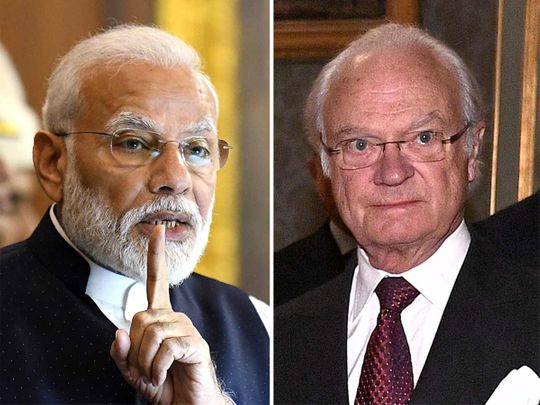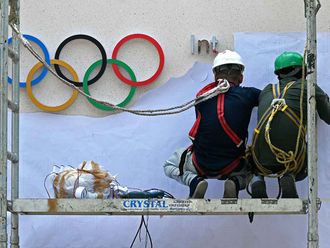
Sweden’s King Carl XVI Gustaf and Queen Silvia will be on a 5-day state visit to India on 2-5 December 2019 after a gap of 26 years. In this state visit, they will be accompanied by the foreign minister Ann Linde, Minister of Enterprise Ibrahim Baylan and representatives of more than 50 Swedish organizations and business houses. Recent years have witnessed an increasing number of high-level visits between India and Sweden.
In June 2015, Pranab Mukherjee was the first Indian President in history to come to Sweden on a state visit. In February 2016, the Prime Minister of Sweden Stefan Löfven had visited India for the ‘Make in India’ industrial fair in Mumbai. In April 2018, India’s Prime Minister Narendra Modi had traveled to Stockholm on a 2-day visit. Officially, in Sweden, these visits are being projected to promote Swedish export of goods and services, while in India, it is being told to attract Swedish investment for ‘Make in India’.
In spite of all these high profile visits, Sweden’s export to India in 2019 is only 0.8% of total goods it exports and Sweden’s import from India is only 0.5% of its total import. To put it in perspective, China accounts for 4.6% of Sweden’s total export and 5.3% of total imports. Moreover, while Sweden’s trade with China is growing by every year, the trade between India and Sweden has remained almost static.
It is difficult to believe that Sweden is unaware of the fact that under Prime Minister Narendra Modi, India since 2014 is witnessing growing intolerance and increased incidences of violence against minorities
Though China is a very big source of trade and investment, Sweden has been quite vocal in criticizing human rights violations in China, with whom it has nearly 7-8 times more trade than India. In spite of China’s repeated threats, Sweden even recently stood firm over a prize for the imprisoned Chinese dissident writer Gui Minhai. Though this has not adversely affected the trade and investment between China and Sweden, the bilateral relations between Sweden and China have considerably deteriorated recently. If Sweden is willing to take the risk and support democratic values and human rights in China, why does is it hesitant to do the same with India?
It is difficult to believe that Sweden is unaware of the fact that under Prime Minister Narendra Modi, India since 2014 is witnessing growing intolerance and increased incidences of violence against minorities. Muslims and Dalits (lower Hindu caste groups) are being publicly lynched regularly and culprits are being encouraged and protected by the ruling regime. Several Muslim places of worship, including Jama Masjid, which Swedish King and Queen are scheduled to visit in Delhi, are being claimed by majoritarian Hindus as their places of worship historically. Violence against Christians and church arson have increased significantly. Modi government is doing everything to throttle the few existing free voices in the media, student movements are being brutally suppressed and foreign support has been denied to more than 13000 NGOs working for socio-economic equality, human rights and environmental protection.
Moreover, on 5 August 2019, the Indian government took away whatever limited autonomy the only Muslim-majority province of the country, Jammu and Kashmir had since India’s independence. To suppress the opposition against this decision, 8 million Kashmiris have been under virtual lockdown by using brute force since then resulting in a serious humanitarian crisis.
Saab is presently competing to sell 114 fighter planes to India under its Multi-Role Fighter Aircraft (MRFA) Program - to deliver 18 Gripens in flyaway condition and to build 96 of them in India in collaboration with Prime Minister Modi’s most favorite business house, Adani Group.
What then explains not only Sweden’s silence on suppression of democratic and human rights in India but also open bonhomie with the present Indian regime? There is no hope at present for any change to the dismal bilateral trade relations as the Indian economy is presently facing a serious crisis. Sweden primarily exports pharmaceuticals, paper & pulp products, chemicals, engineering products, and telecom equipment to India and it is highly unlikely that there will be any substantial increase of India’s demand in these areas while its economic growth has started shrinking. At the same time, Sweden cannot convince India to agree to a Free Trade Agreement with Nordic countries, which Sweden with its neighbours have been pushing since 2007. India has even stayed out of a free trade agreement among many Asian countries, called the Regional Comprehensive Economic Partnership (RCEP) in November 2019.
An only possible explanation of Sweden keeping the Modi government in good humour is its hope to get major arms deals in India, particularly by selling Saab Gripen fighter aircraft. Saab is presently competing to sell 114 fighter planes to India under its Multi-Role Fighter Aircraft (MRFA) Program - to deliver 18 Gripens in flyaway condition and to build 96 of them in India in collaboration with Prime Minister Modi’s most favorite business house, Adani Group. As Saab is competing with rivals such as Boeing, Lockheed Martin and Dassault Aviation for this 15 billion dollar arms deal, Sweden has been traveling the extra mile to keep the Modi government happy.
For its credibility, Sweden should walk the talk. It is thus important for King and his delegation in this state visit to bring up issues like tolerance, human rights, and minority issues in their private and public interactions with Indian political establishment.
Sweden prides itself on being committed to working towards the protection of human rights and to stand up for minorities and powerless. It likes to see itself as a ‘moral superpower’. But, at the same time, while high tension prevailing in the South Asian region due to prevailing warlike situation between India and Pakistan, ‘peace-loving’ Sweden is actively lobbying to sell its Gripen fighter aircraft to India. Not only that but to avoid displeasing the present Indian regime, Sweden has refrained from criticizing its on-going serious undemocratic acts and human rights violations.
For its credibility, Sweden should walk the talk. It is thus important for King and his delegation in this state visit to bring up issues like tolerance, human rights, and minority issues in their private and public interactions with Indian political establishment. They should also express their concerns over the on-going situation in Kashmir. Just for the Gripen fighter aircraft deal, Sweden should not allow itself to be forced by the Hindu nationalist government of Narendra Modi to not to raise its voice against suppression of democratic values and human rights. King’s state visit to India provides an opportunity for Sweden to show to the world that it is committed to standing for the values, which it claims to believe in.
Ashok Swain is a Professor of Peace and Conflict Research at Uppsala University, Sweden.











